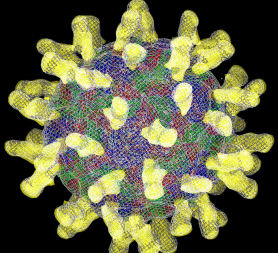Cell science breakthrough could beat common cold
New research suggests the immune system can fight viruses from within healthy cells. Science Correspondent Tom Clarke says the discovery is a “real game-changer” in the fight against the common cold.

New scientific research has unearthed evidence that the human immune system can still fight viruses even when they have already entered a healthy cell.
British scientists based in Cambridge say they have identified a previously unknown mechanism that antibodies use to fight against the virus.
Up until now scientists thought antibodies could only attack viruses outside a cell by blocking its entry to the cell and thus reducing any possible infection.
Dr Leo James from the Medical Research Council’s Laboratory of Molecular Biology said: “Although these are early days, and we don’t yet know whether all viruses are cleared by this mechanism, we are excited that our discoveries may open multiple avenues for developing new antiviral drugs.”
Discovery is 'game-changer'Channel 4 News Science Correspondent Tom Clarke says this discovery is a "real game-changer" in the fight against the common cold.
He said: "For a century, scientists believed that once a virus makes its way into a cell it was beyond the reach of the immune system.
"The discovery that our cells contain their own immune response to viruses is a real game-changer. Many emerging drugs are designed to fight disease by enhancing or priming the immune system and all vaccines work this way. Finding an entirely new branch of our immune system inside cells provides a whole range of new angles of attack.
"Leo James and his colleagues have already shown that boosting levels of the immune molecules they have discovered helps cells kill viruses quicker. Next they want to see if they can make a drug that works to stimulate the production of those molecules and fend off a viral attack.
"This isn't science to be sniffed at, but don't expect a cure for the common cold anytime soon. Though this is an important discovery in the basic science of cells and viruses, it will take researchers a few years just to figure out the detail of what they've discovered. Only then can they begin designing safe and effective medicines."
Dr James and his team reported the findings to the Proceedings of the National Academy of Sciences. The PNAS said this discovery may help in the production of new anti-viral drugs.
However, Dr James warned it will take years before these new drugs are made and it may not work on all viruses.
According to the research once a virus has entered a healthy cell, the antibodies can still attach to the virus and release a protein called TRIM21. This protein then pulls the virus into a disposal system, which is used by the cell to get rid of any unwanted material.
This system usually happens before the cell has been damaged by the virus.
The scientists found that if the amount of the protein TRIM21 is increased, the disposal system in the cell works more efficiently and this, they hope, can help in the development of new antiviral drugs.